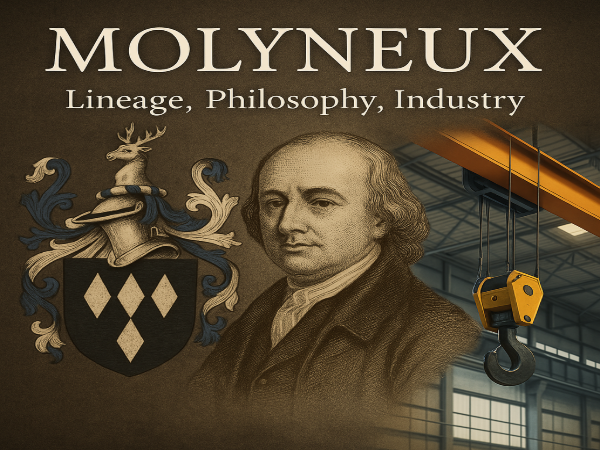Molyneux: The Legacy of a Name That Shaped History and Modern Industry
Uncover the origins, influence, and enduring legacy of the Molyneux name across philosophy, nobility, and industrial innovation.

Molyneux is more than just a surname—it’s a symbol of historical legacy, intellectual depth, and modern enterprise. From its noble roots in Norman France to its presence in British aristocracy, from shaping philosophical debates to powering industrial infrastructure, the name Molyneux spans centuries and disciplines. This comprehensive article explores the multifaceted significance of Molyneux, shedding light on its history, the people who bear it, and the institutions that continue to uphold its legacy.
The Origin and Meaning of the Molyneux Name
The name “Molyneux” originates from the town of Moulineaux in Normandy, France. Derived from the Old French word moulin, meaning “mill,” the name was originally given to individuals who either worked in or lived near a mill. The Molyneux family came to England following the Norman Conquest in 1066 and quickly rose to prominence. By the 12th century, they were established landowners in Lancashire, particularly in Sefton, where they remained influential for centuries.
Molyneux in Philosophy: Molyneux’s Problem
One of the most enduring intellectual contributions bearing the Molyneux name is “Molyneux’s Problem,” a philosophical thought experiment proposed by William Molyneux in 1688. The question, addressed to philosopher John Locke, asked whether a person born blind—who could distinguish objects like a cube or a sphere by touch—would be able to visually identify these objects upon gaining sight. This query opened the door to deep investigations in epistemology, perception, and cognitive science. It continues to be a subject of scholarly debate and academic study.
The Molyneux Family: Nobility and Influence
The Molyneux family held a significant position in British nobility. Most notably, they were the hereditary constables of Liverpool Castle and were later granted the title of Earl of Sefton. The family’s influence spanned from the 12th century through the 18th century, with members serving in both military and political roles. Their estates, heraldry, and public service contributed to shaping English aristocratic traditions. Despite changes in titles and property holdings over time, the Molyneux lineage remains a point of pride and historical interest.
Molyneux in Modern Industry
Today, the name Molyneux extends into the realm of heavy industry through companies like Molyneux Rail. Specializing in crane rail systems and industrial rail infrastructure, these companies continue the legacy of the name in the context of engineering, logistics, and global trade. The transition from noble estates to industrial innovation illustrates the adaptability and enduring relevance of the Molyneux name in contemporary settings.
Notable People Named Molyneux
William Molyneux (1656–1698)
A philosopher and writer, William Molyneux is best known for posing Molyneux’s Problem. He was an associate of John Locke and played a crucial role in early Enlightenment thought.
Emery Molyneux (d. 1598)
An English maker of globes and mathematical instruments, Emery was responsible for the first English globes, used in navigation and astronomy during the Elizabethan era.
Edward Molyneux (1891–1974)
A celebrated fashion designer, Edward Molyneux dressed royalty and film stars, becoming one of the most respected names in 20th-century haute couture.
Juan Pablo Molyneux
A Chilean-American interior designer, Juan Pablo is known for his luxurious, classical interiors featured in estates across Europe and the Americas.
Molyneux Age: Tracing the Lineage
The Molyneux name is over 900 years old, tracing back to the 11th century. Its earliest recorded presence in England dates to the period shortly after the Norman Conquest. This makes the Molyneux lineage one of the longest continuously recognized family names in British history. Members of the family have maintained public profiles across centuries, adapting to changing social and political landscapes.
Molyneux Net Worth: Then and Now
While historical records do not quantify the exact wealth of the Molyneux family during their peak influence, it is evident they held significant land and power in medieval and early modern England. In contemporary times, individuals bearing the Molyneux name—especially those in fashion, design, or industry—have accumulated varying degrees of wealth. However, no single net worth figure represents the modern Molyneux collective, as the name now spans numerous industries and individuals.
Molyneux on Wikipedia: A Resource for Knowledge
Wikipedia hosts multiple entries related to the name Molyneux. From individual biographies like William Molyneux and Juan Pablo Molyneux to topics like Molyneux’s Problem and the Earl of Sefton, the platform offers a wide array of information. These pages serve as valuable resources for researchers, students, and anyone interested in the legacy and breadth of the Molyneux name.
Cultural and Geographic References to Molyneux
The Molyneux name also appears in various geographical and institutional contexts:
Molineux Stadium: Home of the Wolverhampton Wanderers Football Club.
Molyneux Ward: A district in the Metropolitan Borough of Sefton.
Molyneux Park: A sports ground in Alexandra, New Zealand.
These uses underscore the name’s ongoing cultural relevance.
Conclusion: The Enduring Legacy of Molyneux
From medieval nobility to philosophical breakthroughs, and from industrial innovation to high fashion, the Molyneux name encapsulates a broad and rich legacy. It is a name that has adapted to changing times while preserving its historical significance. Whether you encounter Molyneux in academic texts, industrial catalogs, or football stadiums, know that it represents a legacy of resilience, intellect, and influence that continues to shape the world.
With over nine centuries of history behind it, Molyneux is not just a name—it’s a legacy.



